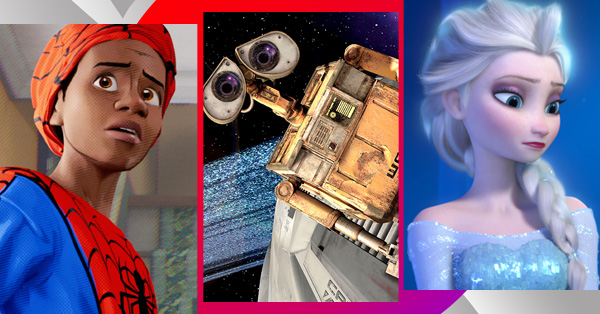Makoto Shinkai’s Suzume is an openhearted romantic journey about inheriting a damaged world. Picture: Crunchyroll
To make animated motion pictures in Japan is to dwell within the shadow of Hayao Miyazaki, and Makoto Shinkai has been ducking comparisons to the legendary artist since his 2016 hit Your Title surpassed Spirited Away on the world field workplace. In his new movie, Suzume, Shinkai surrenders to the inevitable by placing his teenage heroine in pursuit of a magical speaking cat named Daijin. Daijin is wide-eyed, cute, and decidedly Ghibli-esque — like a sinister sibling of Jiji from Kiki’s Supply Service, provided that wherever he goes, catastrophe appears to observe. If Daijin is a nod to the king of Japanese animation, he’s additionally a reminder of simply how totally different Shinkai’s work is in the way it blends magical journey with modern particulars. Suzume takes place in a universe the place folks have watched Miyazaki’s movies and submit, “OMG, I really feel like I’m in Whisper of the Coronary heart!” because the caption on an image of Daijin on the prepare, leaving a path of social-media posts for Suzume (Nanoka Hara) and her companion Souta (Hokuto Matsumura) to observe throughout the nation. That grounding within the current is one purpose Shinkai is such an unbeatable purveyor of untrammeled youthful emotion. Suzume isn’t timeless — it’s very a lot about its second, about coming of age in a contracting Japan whose future is unclear.
It’s additionally about saving the day and falling in love below the skies which are Shinkai’s signature: striated with feathery clouds, strewn with stars, providing an enormous gradient of blues and purples. If Shinkai’s protagonists begin off in worlds marked by mundane textures — like the main points of the intense, cluttered home that 17-year-old Suzume lives in along with her aunt, Tamaki (Eri Fukatsu), in a seaside city in Kyushu — these skies signify the promise of grandeur. That grandeur arrives in Suzume’s life due to a brush with a passing stranger as she’s headed to highschool one morning. A younger man who’ll finally introduce himself as Souta asks if there are any ruins close by, telling her, “I’m on the lookout for a door”; on Suzume’s recommendation, he heads towards an deserted village close to the mountains. Unable to cease fascinated by the unusual encounter (and the man’s magnificence), she follows him to the wreck of the outdated spa city, and finds, as promised, a door in the course of nowhere that opens onto a twilight panorama she will be able to see however can not get to, in addition to a statuette that transforms into Daijin and hops away. That different world seems to be dwelling to an enormous worm that retains making an attempt to make its approach into ours, the place it threatens to crash into the bottom and trigger earthquakes. And Suzume has unknowingly weakened the limitations retaining it away.
That worm is a tackle the large catfish that, in myths, lives below Japan and causes seismic disruptions each time the god tasked with holding it down with a stone slips in his duties. It additionally brings to thoughts Haruki Murakami’s “Tremendous-Frog Saves Tokyo,” during which a downtrodden salaryman is visited by an enormous frog who asks for his assist battling a worm below town with a purpose to cease it from, sure, inflicting an earthquake. Just like the protagonist of that brief story, Souta seems to have an unremarkable life exterior his responsibility to hunt out and shut magical doorways that, when open, give the worm an opportunity to wreak havoc. Whereas Souta’s significantly hunkier than the salaryman, he additionally spends a lot of the movie reworked into a toddler’s picket chair, an amusing indignity for a swoony love curiosity. As Suzume and Souta (in chair kind) chase Daijin throughout the nation, they try to typically fail to cease the pure disasters erupting alongside the way in which, however their acts of bravery and sacrifice are invisible to everybody round them.
Disaster runs by the movie like silvery scar tissue — Suzume’s mom died within the 2011 earthquake — however behind that’s the extra gradual disaster of the shrinking inhabitants chargeable for so lots of the deserted areas the place the worm is ready to escape. Countering this decline, within the movie’s loveliest concept, is the neighborhood and connection Suzume will get from the strangers who assist her alongside the way in which, and from the exasperated however loving aunt who raised her. Like Shinkai’s earlier movie, Weathering With You, Suzume is about younger individuals who’ve inherited duty for a crumbling world they need to danger all the pieces to avoid wasting. It’s additionally a tribute to the mundane — to Souta’s cluttered however cozy scholar residence, to the ramshackle purple convertible his pal Tomoya (Ryunosuke Kamiki) drives, to the red-faced prospects on the Kobe bar Suzume finally ends up spending an evening in, to the folks jogging alongside the river or making their approach dwelling from work on the finish of the day. Suzume could also be a much less efficient romance than one thing like Your Title — it’s powerful when half of your fundamental pairing is a bit of furnishings — however that’s as a result of its actual love story is with the stuff of on a regular basis life, making it virtually unbearably invitingand value preventing for.
